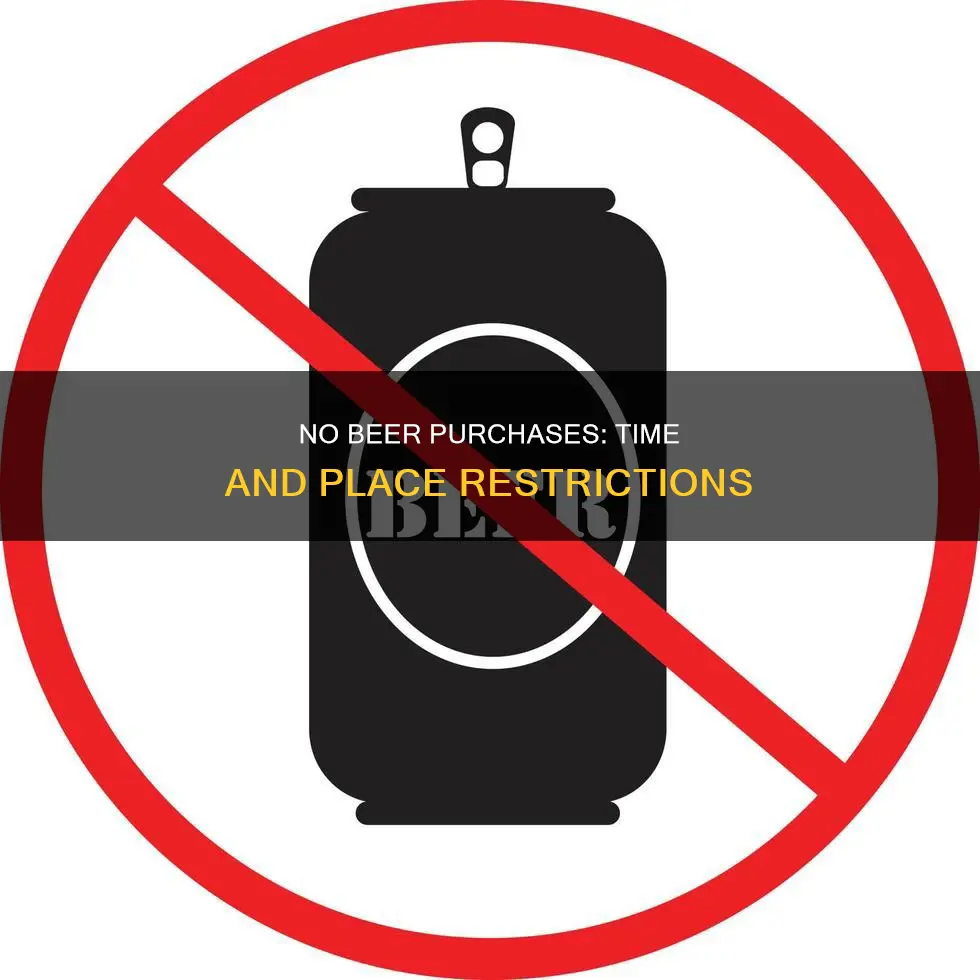
Alcohol laws vary widely across the United States, with each state and territory having the power to regulate intoxicating liquors within their jurisdiction. While the National Minimum Drinking Age Act, enacted in 1984, requires all states to set their minimum age to purchase alcoholic beverages to 21 years, there are exceptions to this rule. For example, in some states, those under 21 can drink for religious or medical purposes, or if they are accompanied by a parent or guardian.
In addition to age restrictions, there are also laws governing the days and hours when alcohol can be purchased. These laws differ by state and can be further restricted by local jurisdictions. For example, in some states, alcohol sales are prohibited on Sundays or certain holidays, while in others, alcohol can be purchased 24 hours a day.
Furthermore, the type of alcohol and the premises/business type also play a role in determining when beer can be purchased. For instance, some states only allow the sale of beer and wine in supermarkets, while others restrict the sale of certain types of alcohol to state-run stores. Understanding the specific alcohol purchasing laws in your state is essential to ensure compliance with local regulations.
| Characteristics | Values |
|---|---|
| State | Texas |
| Day of the week | Monday to Friday |
| Time | 7 a.m. – midnight |
| Day of the week | Saturday |
| Time | 7 a.m. – 1 a.m. (Sunday morning) |
| Day of the week | Sunday |
| Time | 10 a.m. – midnight |
What You'll Learn

If you are under 21
However, the laws surrounding the purchase of non-alcoholic beer (NA beer) by those under 21 are less clear. NA beer typically contains less than 0.5% alcohol by volume (ABV), which is significantly lower than traditional beer, which usually ranges from 4-6% ABV. While NA beer is non-alcoholic, it is still regulated by the Federal Alcohol Administration Act. This is due to a legal anomaly where any malt beverage is regulated by the FAA, regardless of its ABV.
The laws regarding the legal drinking age and the definition of an alcoholic beverage vary by state, and some states have different rules for purchasing and consuming NA beer. In some states, minors cannot purchase alcohol but may consume it under certain conditions, such as with the supervision of a parent, guardian, or spouse who is over the age of 21.
States where you CAN purchase non-alcoholic beer under the age of 21:
Ohio (must be over 18)
States where you CANNOT purchase non-alcoholic beer under the age of 21:
- Oregon (for 0.5% ABV and above)
- West Virginia (for 0.5% ABV and above)
- Wyoming (for 0.5% ABV and above)
States with undefined or unclear laws:
Alabama (not regulated in wet counties; "sale" is prohibited in dry counties)
Due to the complexity of these laws, many retail stores and online retailers require customers to be at least 21 years old to avoid any legal issues. It is important to know the specific regulations and retailer policies in your state before attempting to purchase NA beer if you are under 21.
Trappist Beer: Where to Buy Spencer's Brew
You may want to see also

If it's outside of your state's specified hours
If you're trying to buy beer outside of your state's specified hours, you may be out of luck. While it's important to note that laws regarding alcohol sales vary across the United States, with some jurisdictions even passing their own laws, there are certain times when beer purchases are typically prohibited.
In many states, the sale of alcohol is restricted to specific hours on Sundays. For example, in Texas, beer sales are permitted in grocery and convenience stores from 10 a.m. to midnight on Sundays, while liquor sales are prohibited. Similarly, in Alabama, while beer and wine sales are not controlled by the state, on-premise and off-premise liquor sales are limited to 2 a.m. on Sundays.
Additionally, some states have laws prohibiting alcohol sales during certain holidays. For instance, in Texas, liquor stores must remain closed on Thanksgiving Day, Christmas Day, and New Year's Day. Idaho also restricts liquor sales on Memorial Day, Thanksgiving, and Christmas, though counties and cities can make exceptions, except for Christmas Day.
It's worth mentioning that some states, like California, allow alcohol sales 24/7, while others, like Arizona, permit alcohol sales every day from 6 a.m. to 2 a.m.
To ensure you don't run into issues when trying to purchase beer, it's always a good idea to check your state's specific laws and regulations, as they can change at any time.
Best Places to Buy Affordable Corona Beer
You may want to see also

If it's a Sunday in Texas
Texas has some complicated alcohol laws, so it's no surprise that buying beer on a Sunday can be a challenge.
There are some exceptions to the rule. If you're at a live event, such as a sports game, festival, fair, or concert, you can buy beer from 10 am onwards. And, if you're staying in a hotel, the hotel bar can serve you beer at any time of the day.
It's also worth noting that Texas liquor stores are closed on Sundays, so you won't be able to buy beer from these outlets.
So, if you're planning a Sunday session in Texas, make sure you plan ahead!
Grocery Beer Buying in Nosara: What's the Deal?
You may want to see also

If you are in a dry county
In the United States, dry counties are typically found in the South, with the largest number located in Arkansas. A dry county may be contrasted with a "wet" county, where alcohol sales are allowed and regulated, or a "moist" county, where some alcohol sales are permitted.
While the Twenty-first Amendment to the United States Constitution repealed nationwide Prohibition, it left alcohol prohibition legislation to the discretion of each state. Some states, like Mississippi, have their own prohibition laws, making it illegal to bring alcohol through their dry counties while traveling across the country.
Some examples of dry counties in the United States include:
- Ashley County, Arkansas
- Lafayette County, Florida
- Moore County, Tennessee
- Montgomery County, Alabama
- Pike County, Arkansas
Samuel Smith Beers: Where to Buy and Enjoy
You may want to see also

If you are in a dry state
The concept of a dry state emerged in the 19th and early 20th centuries, with Maine becoming the first state to implement a law prohibiting the production and sale of alcohol in 1851. This was followed by Delaware, Ohio, Illinois, Rhode Island, Minnesota, and Massachusetts, though all but one of these laws were eventually repealed.
By 1913, nine states had statewide prohibition, and 31 others had local option laws, meaning over 50% of the US population was under some form of alcohol prohibition. In 1917, Congress approved a resolution to prohibit the manufacture, sale, transportation, and importation of alcoholic beverages, which became the Eighteenth Amendment. Nationwide prohibition went into effect on January 17, 1920, and was repealed in 1933 with the passage of the Twenty-first Amendment.
Today, counties that allow alcohol are considered "wet", those that prohibit alcohol sales are "dry", and those with special circumstances or a mix of wet and dry jurisdictions are "moist". While there are no longer any completely dry states, 33 states have laws allowing localities to prohibit the sale, consumption, and possession of alcohol, mainly in the South, often motivated by religious beliefs.
For example, Arkansas has 34 dry counties out of 75, and all alcohol sales are prohibited on Sundays. New Mexico is wet by default but is dry on Sundays until noon. These laws prohibiting Sunday alcohol sales are known as blue laws. Kansas, Mississippi, and Tennessee are dry states by default, meaning counties must specifically authorise the sale of alcohol.
In addition to dry counties, there are also dry cities, towns, and townships, which are smaller jurisdictions that prohibit alcohol sales.
Amstel Beer: Where Canadians Can Buy It
You may want to see also
Frequently asked questions
In Texas, beer cannot be sold between midnight and 7 am from Monday to Friday, and between 1 am and 7 am on Saturday. On Sunday, beer cannot be sold between midnight and 10 am.
In California, beer cannot be sold between 2 am and 6 am any day of the year.
In Alabama, beer cannot be sold after 2 am on Sundays.
In Alaska, beer cannot be sold between 5 am and 8 am any day of the week.
In Arizona, beer cannot be sold between 2 am and 6 am from Monday to Saturday, and between 2 am and 10 am on Sunday.







